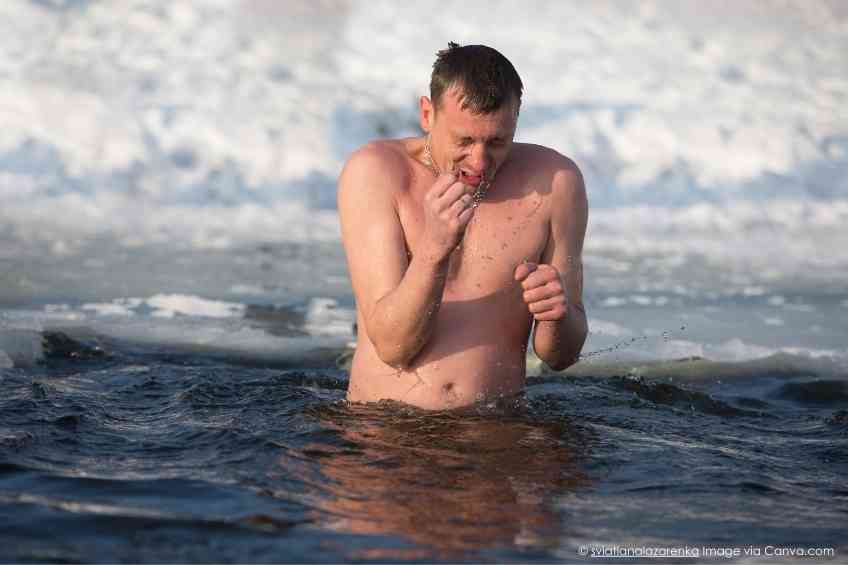By John Hand –
Every New Year’s Day, regardless of weather conditions, thousands if not hundreds of thousands of people worldwide, head to local beaches. Some will be dressed in Santa costumes, others will wear only a speedo, but the goal for all will remain the same: dive into the water. Now this might not seem ludicrous in warm-water climes, but these polar plunges are taking place in New York, Chicago, Boston, Michigan and God forbid, Milwaukee, among other places, on January 1 when temperatures not only dip below freezing, but they can drop below zero Fahrenheit.
Ultimately, the act and aim of polar plunges is rather simple. They are designed to anoint the New Year and the dippers themselves by jumping into freezing icy water and running back out onto land.
What happens to the bodies of these plungers through this ceremonial ritual is said to be a euphoria that science is trying to explain. Whether this is a health idea is equally uncertain, although these freezing dips are probably dangerous for some.
Regardless of the possible consequences, dipping isn’t new. New Year’s Day 2024 will make the 120th time the Coney Island Polar Bear Club has jumped into the Atlantic Ocean to ring in a new calendar. In fact, the club, which is the oldest winter bathing organization in the United States, loves a polar plunge so much that they do a dip every Sunday.
“It takes you to a different place,” Naum Barash, a 30-year veteran of Coney Island polar plunges, told New York Magazine. “You feel like a newborn.”
Many cold-water bathers also report improvements in their overall mental health due to a decrease in stress and anxiety after emerging from a polar plunge. In addition, people claim to feel better physically after a good freezing. Some maintain that the shiver experienced while in the cold water is like that of a workout, therefore increasing one’s metabolic rate. Another theory supporting polar plunges is that cold water boosts a person’s immune system. Chronic inflammation is even thought to be cured by a polar plunge.
Despite these supporting theories, there is limited research on the effects of polar plunging. One reason is that no two dips into freezing cold water are identical. Water temperatures vary and so does the length someone stays in. Then, of course, there is the overall health of the person involved in plunging.
There are potential drawbacks, some of them dangerous, to the practice as well. Beyond this, many dippers may be misreading their body’s signals from the freezing plunges, interpreting reactions as beneficial when they’re not.
The feeling of rebirth after getting out of a cold plunge is most likely from the relief the body is feeling after being shocked. Consider that jumping into cold water shocks the body with almost as many jolts as a lightning strike. Beyond this, the national Weather Service warns that cold water drains the body of heat four times faster than cold air.
“People talk about being full of energy, and they perceive that this has done them good,” said Mike Tipton, a professor at the University of Portsmouth. “But that’s because the body is responding to stress with a ‘fight-or-flight’ response and preparing to get you out of that environment, and that may well give you a feeling of quasi-euphoria.”
There are other possible dangers too. The American Heart Association, for example, warns that a cold water shock can immediately put a body in distress, resulting in spikes in breathing, heart rate and blood pressure. The National Weather Service adds to this that a plunge of any length can cause involuntary gasping, rapid breathing and hyperventilation that might lead to drowning.
The National Center for Cold Water Safety also warns that rapid immersion into cold water can lead to increased risks of heart failure and stroke.
Admittedly, some limited research has surfaced to support the benefits of cold-water therapy. This includes work that indicates cold water can help with Type 2 diabetes, but nothing is proven that cold water is a factor in weight loss. Ice has long been used to reduce inflammation, but there is nothing definitive about the effect cold exposure has on chronic inflammation, as chronic inflammation is a tough area to study. Some studies have even shown that a change in white blood cells after polar plunges, hinting that cold exposure could fight infections.
Unfortunately, most supportive tales of cold water helping someone stay healthy are anecdotal at best. The related research is also focused on controlled situations that don’t involve random people running into the ocean at Coney Island after a night of partying on New Year’s Eve.
“A lot of claims are being made and leaps of faith are being made based on absolutely nothing, or just a few papers and social media,” said Francois Haman, a professor who studies cold exposure at the University of Ottawa.
Does all this mean a polar plunge is out of the question? No, but it would be prudent to recognize the potential dangers while steading yourself to ring in the New Year with a cold and icy one.













